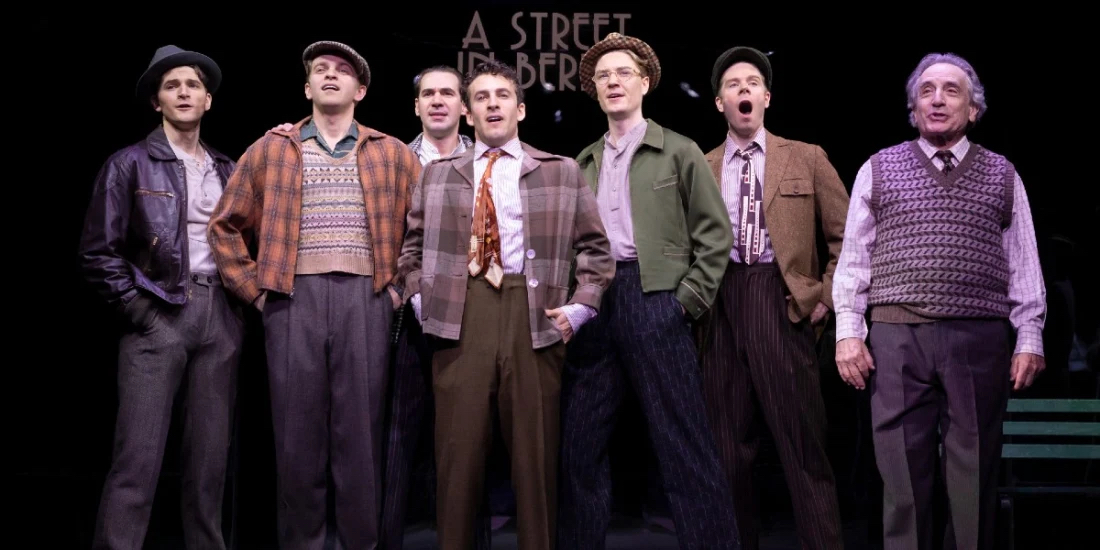HARMONY (Broadway Transfer)
Book and Lyrics by Bruce Sussman
Music by Barry Manilow
Directed and Choreographed by Wayne Carlyle
Ethel Barrymore Theatre
Official Website
Reviewed by David Spencer
[Some of the following material is drawn from my original 2022 notice.]
The Comedian Harmonists were a German, all-male singing group of six. They performed between 1928 and 1934. Their stock-in-trade was, the name says it, humor and close harmony. One of their signatures was their knack for easing one voice or another out of the blend and into prominence and then seamlessly back again. They were highly popular in Europe, and their tenure in show business ended when, thanks to their irreverence, they predictably fell afoul of the Nazis.
And they, of course, are the subject of the musical Harmony, finally having a its Broadway debut after what was a de facto out-of-(mid)town tryout via the National Yiddish Theatre Folkbeine within the Museum of Jewish Heritage. The show has had a long gestation process and many delays due to unfortunate circumstance…with which I can totally relate…and is now having what seems to be a triumphant vindication—with which (happily) I can also relate. The book and lyrics are by Bruce Sussman and the music is by Barry Manilow—best known, of course, for their work as pop songwriters (Manilow, also of course, as a legendary performer of his own work)—but there’s no “cheating” here, none of the laziness or unfamiliarity with craft that has often attended pop writers venturing into musical theatre waters. Like David Yazbek before them, they seem to have been weaned on the stuff, to have been properly influenced by the greats, and deliver with commensurate gravitas.
Narrated from the 1988 perspective of its one surviving member, eightyish but highly energetic and lucid Robbi (Chip Zien)—who will also step into the action to play various middle-to-senior-aged celebrities of the bygone era, who interacted with the Harmonists;—he chronicles the trajectory of his younger self (Danny Kornfeld), the leader Harry (Zal Owen) and the other equally distinctive members (Sean Bell, Erich Peters, Blake Roman, and Steven Telsey). There’s a nice black box-fluidity to the narrative—ably abetted by director-choreographer Warren Carlyle—and the characters are engaging; importantly, this includes the two who become wives: Robbi’s bride Mary (Sierra Boggess) and Ruth (Julie Benko). The songs are likewise intelligent, attractive and dramatically sound. Which sounds kind of academic, but I mean it as high praise.
What’s best of all to the experience of watching it anew is the exhilaration of seeing that the creative team has done their interim homework.
In my initial review, I wrote this:
However—and this is a tricky however, because I don’t mean it to diminish your enthusiasm about attending—I think the show has a ways to go. Perhaps not a long way; it may be no more than bolt-tightening. For Harmony seems (to me) to be in its almost there phase; a phase that’s inevitable for a show that’s been taken out of suspended animation, revised and tweaked with the wisdom of past-work-done and much-thought-between, and then put fairly quickly on its feet.
There are two things that struck me as needing that final push:
The first…the show kind of touches you, which is nice, but in the end it should kill you. What keeps it from getting there? Maybe a number of subtle things I didn’t see; but the big one I clocked was that, too often, it announces its emotional hand before playing it musically; for example, the dialogue leading into Mary’s song declaring her feeling for Robbi basically does the work the song does; lead-in dialogue should deliver only context, and leave the message to emerge only from the song—especially where ballads are concerned. I think variations on this kind of “security leak” may also be affecting the power of the ending.
The second…Naturally, the songs sung by the Harmonists in this musical are not the songs they actually sang, but rather pastiches of style, riffs on sensibility. They’re also a little funnier than the actual songs…humor-wise, the real-life harmonists were mild and merry, rather than hilarious. The upgrade on the funny is good; but some of the ideas and some of the idiomatic expression are, if not strictly anachronistic, just that little bit out-of-sync with period enough to make you aware that these newer songs are…well…newer, and that the authors are trying to get away with “risqué-ness” that’s a bit too blatant for those guys in that era.
But all of that—all of it, and whatever’s collateral to it—is eminently adjustable without trauma to the spine, structure or score of the show; even if it involves replacing some musical material, nothing should prevent the final push of work from being done calmly and methodically; this isn’t back to workshop time; this is the space between the penultimate version and endgame. And if Harmony gets its opportunity to move uptown—and it should—I have faith that the creative team can target the spots that need attention.
That faith was not unjustified.
They did it. Judicious cutting, reconsideration, tone management. All of it. All of it that matters, at least.
The opportunity to do this is a circumstance I know well.
It’s a gift.
It doesn’t come along often.
And when it does…you have to hug it.
The creative team has.
And now you can hug Harmony too.
